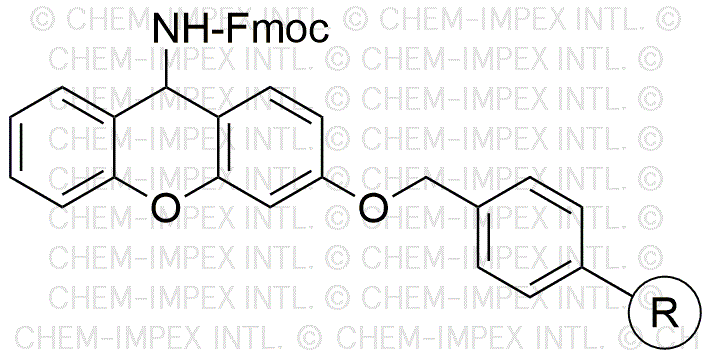9-Fmoc-aminoxanthen-3-yloxy-polystyrene resin is widely utilized in research focused on:
- Peptide Synthesis: This resin serves as a solid support for the synthesis of peptides, allowing for efficient coupling and deprotection steps in solid-phase peptide synthesis (SPPS).
- Drug Development: It is used in the development of pharmaceutical compounds, particularly in the creation of peptide-based drugs, enhancing the efficiency of drug discovery processes.
- Bioconjugation: The resin facilitates bioconjugation reactions, enabling researchers to attach biomolecules to surfaces or other molecules, which is essential in creating targeted therapies.
- High-Throughput Screening: Its properties make it suitable for high-throughput screening applications, allowing researchers to quickly evaluate multiple compounds for biological activity.
- Custom Polymer Synthesis: The resin can be tailored for specific applications, providing flexibility in creating custom polymers for various industrial applications, such as sensors or drug delivery systems.
General Information
Properties
Safety and Regulations
Applications
9-Fmoc-aminoxanthen-3-yloxy-polystyrene resin is widely utilized in research focused on:
- Peptide Synthesis: This resin serves as a solid support for the synthesis of peptides, allowing for efficient coupling and deprotection steps in solid-phase peptide synthesis (SPPS).
- Drug Development: It is used in the development of pharmaceutical compounds, particularly in the creation of peptide-based drugs, enhancing the efficiency of drug discovery processes.
- Bioconjugation: The resin facilitates bioconjugation reactions, enabling researchers to attach biomolecules to surfaces or other molecules, which is essential in creating targeted therapies.
- High-Throughput Screening: Its properties make it suitable for high-throughput screening applications, allowing researchers to quickly evaluate multiple compounds for biological activity.
- Custom Polymer Synthesis: The resin can be tailored for specific applications, providing flexibility in creating custom polymers for various industrial applications, such as sensors or drug delivery systems.
Documents
Safety Data Sheets (SDS)
The SDS provides comprehensive safety information on handling, storage, and disposal of the product.
Product Specification (PS)
The PS provides a comprehensive breakdown of the product’s properties, including chemical composition, physical state, purity, and storage requirements. It also details acceptable quality ranges and the product's intended applications.
Certificates of Analysis (COA)
Search for Certificates of Analysis (COA) by entering the products Lot Number. Lot and Batch Numbers can be found on a product’s label following the words ‘Lot’ or ‘Batch’.
Número de catálogo
Número de lote/lote
Certificates Of Origin (COO)
This COO confirms the country where the product was manufactured, and also details the materials and components used in it and whether it is derived from natural, synthetic, or other specific sources. This certificate may be required for customs, trade, and regulatory compliance.
Número de catálogo
Número de lote/lote
Safety Data Sheets (SDS)
The SDS provides comprehensive safety information on handling, storage, and disposal of the product.
DownloadProduct Specification (PS)
The PS provides a comprehensive breakdown of the product’s properties, including chemical composition, physical state, purity, and storage requirements. It also details acceptable quality ranges and the product's intended applications.
DownloadCertificates of Analysis (COA)
Search for Certificates of Analysis (COA) by entering the products Lot Number. Lot and Batch Numbers can be found on a product’s label following the words ‘Lot’ or ‘Batch’.
Número de catálogo
Número de lote/lote
Certificates Of Origin (COO)
This COO confirms the country where the product was manufactured, and also details the materials and components used in it and whether it is derived from natural, synthetic, or other specific sources. This certificate may be required for customs, trade, and regulatory compliance.


